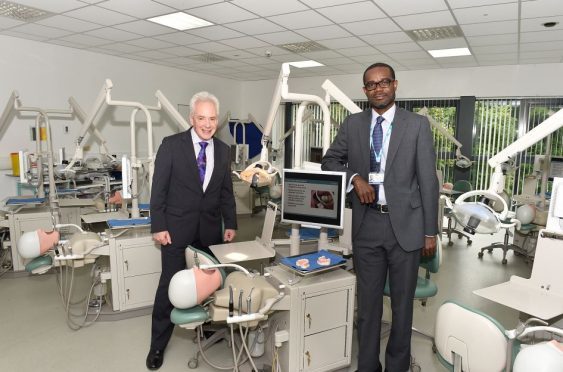North-east health chiefs last night officially declared the region’s dental crisis over following a “historic” rise in registered patient numbers.
It comes as chief executive of NHS Grampian, Malcolm Wright, set the health board’s sights on further “ambitious” goals – including registering 46,000 more people with local dentists.
He also joined with the health board’s lead consultant for dental public health, Jonathan Iloya, in a pledge to battle oral cancer.
The most up-to-date figures show the number of people registered with an NHS Grampian dentist has leapt from 35.2% in 2007 to 73.6%, with 87.4% of children now signed up.
Since 2008, 215,000 new patients have registered at a dentist practice in the north-east.
Speaking from the flagship Aberdeen Dental School, which opened in 2009, Mr Wright said there had been a “step change” in the past decade.
He placed the turn around on an increase in local dental facilities and a bolstered work force of dentists, nurses, dental therapists and oral hygienists.
Mr Wright said: “It has been a remarkable change and I think just (due to) an increase in workforce, dental practices, an increase in the facilities we’ve have got; meaning more people being able to be registered, more things being spotted early, and fewer incidents of teeth being removed and of dental caries.
“There has been remarkable improvements since 2007.
“I think across Scotland it was widely recognised that people’s abilities to access a dentist was severely compromised.”
He added the “physical investment” and “investment in the workforce” in Grampian has led to “a dramatic rise in the numbers of adults and children registered at dentists”.
Eleven years ago hundreds of Aberdonians were forced to queue in the winter cold to re-register at Woodside Dental Practice in Aberdeen.
The surgery was one of many in the north-east – including others in Inverurie, Banchory and Fraserburgh – to go private, and there were fears thousands of people could be left without a dentist.
Mr Iloya said the health board had been forced to “innovate” in the face of an emerging health crisis which meant a large chunk of the population “couldn’t get access to a dentist”.
“To put it in an NHS Grampian picture – in 2007, one in three people were registered with a dentist,” he said.
“That wasn’t a situation that was good for the public and it wasn’t a situation that we at NHS Grampian felt was acceptable.
“We had to do things, we had to innovate to improve access to dentistry and to improve the oral health of the population.
“We’ve had massive campaigns to recruit dentists to the area, taking part in the SDAI (Scottish Dental Access Initiative) which has actually helped us start off about 19 new practices across Grampian.
“We now have seven in ten people registered with an NHS dentist and oral health has improved vastly as well. Children’s oral health is so good, about seven in 10 children do not have dental decay.”
Mr Iloya added there was a higher use of “private dentistry” in Grampian than anywhere else in Scotland.
He said: “As such we are unlikely to be at the same levels as other health board areas. The point is if they do want to have access to NHS dentistry they can make an active choice.”
